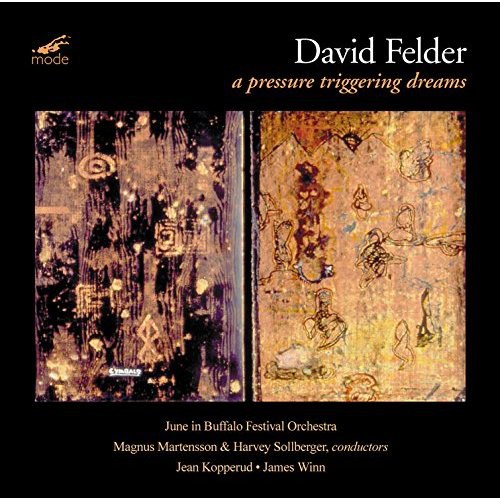- A Pressure Triggering Dreams
: Review
Here in Denmark, the possibilities to find new American music on CD are surprisingly poor. Is it because sales and export over there are more commonly done over the internet than in Europe. Here is, however, a CD from mode records, that I previously knew through Cage releases, with three works by David Felder.
Felder is Professor of Composition at SUNY Buffalo, and his professional craftsmanship is immediately displayed from the first seconds of Six Poems from 1993, where one is suddenly surprised by an effect-full, hard edged orchestral writing. In what follows, the listener quickly understands that David Felder has an impressive ability to establish a sound universe, in which one is taken through every corner of experience, with Felder's special love for the brutally hammered, dramatic contrasts, thrilling effects (as in film music), and with a well developed formal thread in the shape of long, expansive melodic lines.
The work sounds like a contemporary variant of the tone language that was established with Schoenberg's Five Pieces for Orchestra Op.16, from 1909. That, which at the time was the beginning of something new, is here presented in an established shape, with the musical conquests of the 20th century as background. We are dealing with a combination of a well known expressionistic tradition, and something immediate, and elemental, that cannot escape making an impression. Interestingly enough, Felder emphasizes the fact that the work is based on a fragment that was intuitively composed, and that was used as an "ur-source," in that all material in the piece is obtained from this source, and that it is continuously present saturating all layers of the composition.This technique seems immediately parallel to the discovery/invention of dodecaphony three quarters of a century ago.
Of course, it is not a re-invention of the deeper palate. Felder knows both dodecaphony and its history. His music can serve as an excellent example of the desire for the unification of compositional principles, when it comes to single works, groups of works, or, in general, for the entire output, that has been present in so many of the composers of the last decades of the 20th century. Dodecaphony and serialism are here a precondition for the unfolding of individual creativity. To meet the works on this CD, that all arouse the traces of the historical establishment of all subsequent expressionistic bases, is both a peculiar and a thought provoking experience.
There is not for a moment a doubt that these three works are contemporary music. Such is also true for Coleccion Nocturna, for clarinet, piano, and tape (1982), and a pressure triggering dreams (1997). In the former, we meet a chamber musical version of the language in Six Poems, whose full title indicates its inspiration from Pablo Neruda's poetry. This inspiration is also the basis for Coleccion Nocturna, in which we hear the melodic lines in a hovering polyphonic universe with the clarinet as the guide. In a pressure..., the inspiration comes from Nietsche- the title is an expression of Nietsche's thoughts about Wagner's music and its consequences on the listener. The orchestra is here supplemented by computer processed flute sounds and amplified-effects. What we hear here is not a synthesis between natural and synthetically processed sounds, but an effect-full `concertino' -- an orchestra within the orchestra. This creates an almost schizophrenic experience, which supports the tension-filled, compressed character. There are not many resting points in this work, which is filled with contrasts and violent explosions.
In all, David Felder's music is filled with an immediate appeal and is penetrated by an outstanding control of compositional techniques. The performances on this CD are on that same level.
